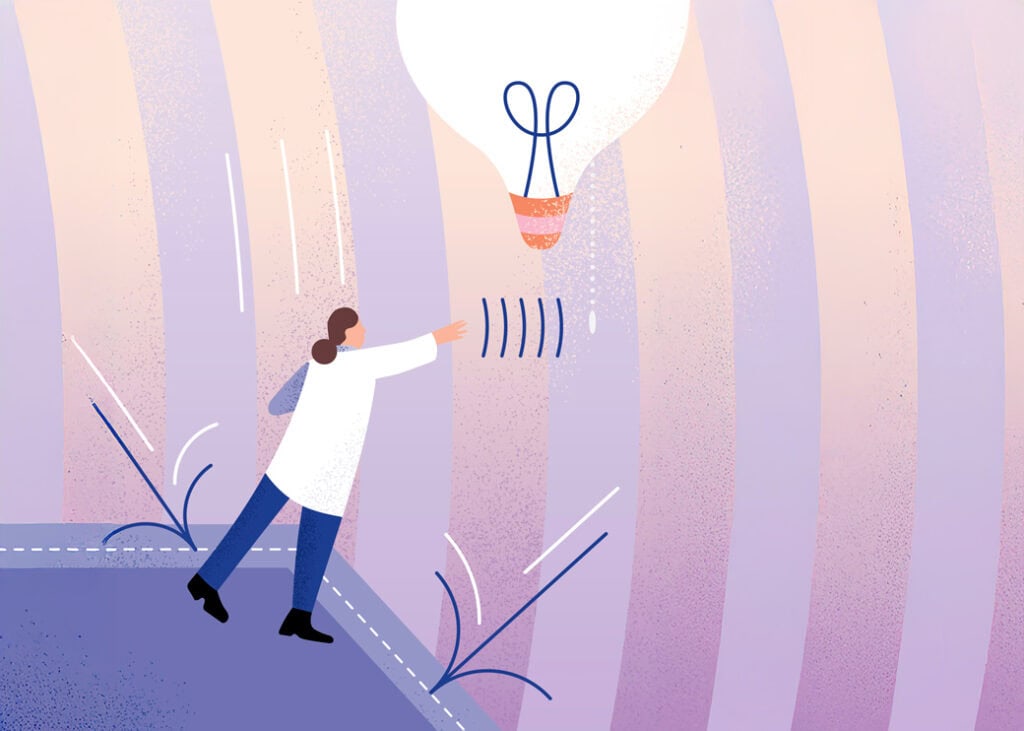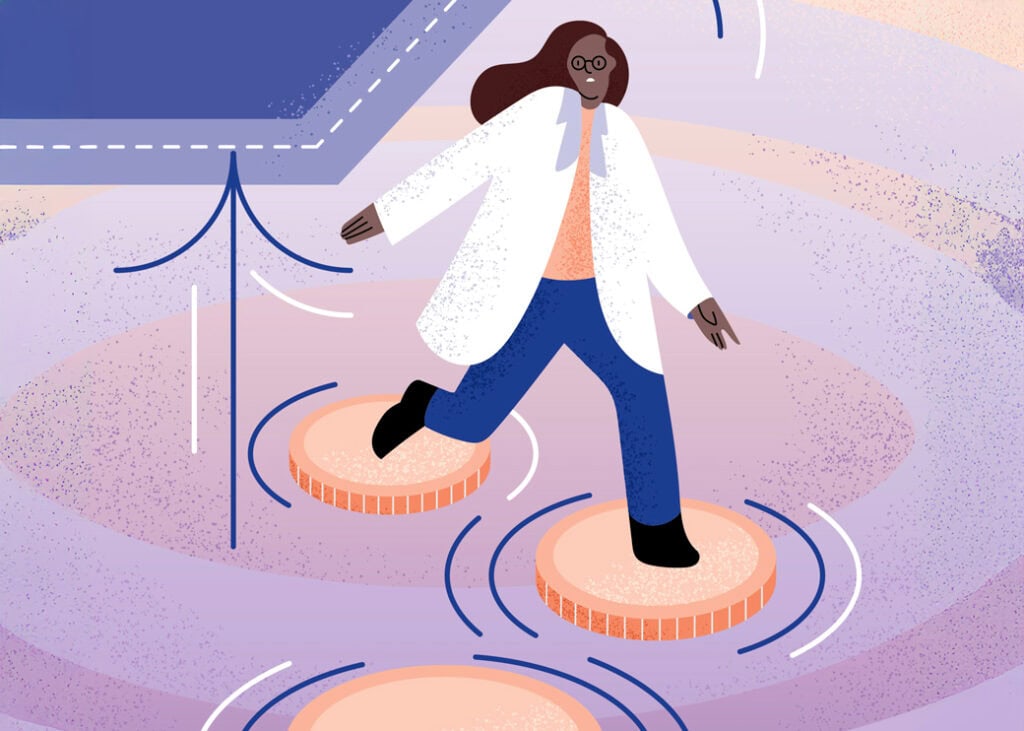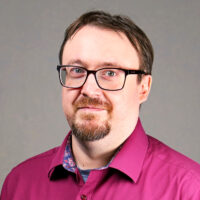
Time to think
Scientific insights require peace and quiet, and the end result is still not a foregone conclusion. Does science still have enough time and space for insight or taking risks?
Text terhi hautamäki images anna-kaisa jormanainen english Translation Marko saajanaho
Are researchers these days too busy writing to read? Or has academic reading turned from a pleasure to a burden, from a profit to a cost?
Questions such as these were pondered by University of Eastern Finland Associate Professor of Cultural Studies Juhana Venäläinen in his article published four years ago. He covered “the conflicting rhythms of thinking” – the combined pressure of quick and long-term tasks in a profit-driven, operationalised university.
The challenge of reading is one example of the principles of profitability and operationalisation affecting academic endeavours. What cannot be measured becomes a time cost.
“Without reading prior research, we operate in a vacuum. That means losing the scientific idea of the accumulation of science and being inspired by other people’s ideas.”
Juhana Venäläinen, Associate Professor of Cultural Studies, University of Eastern Finland
An academic must be a well-read individual. Despite this, it is often difficult to take time for actual reading. According to Venäläinen, reading a book from cover to cover is becoming such a time investment that one must consider if doing so is sensible. The article has become the base unit of reading.
Writing is unquestionably considered useful, with the number of publications being measured. Reading is the invisible flip side of writing – its usefulness cannot be directly measured but it is an essential part of scientific advancement and the creation of publications.
“Without reading prior research, we operate in a vacuum. That means losing the scientific idea of the accumulation of science and being inspired by other people’s ideas”, Venäläinen says.
Venäläinen is impressed by his professor colleague who frequently sits at the campus cafeteria absorbed in a book despite surely having urgent work on his plate. Venäläinen thinks reading at the university during the day is starting to look like a form of rebellion – this is how confidently a person can take their time to maintain their own creative state.
Uncertain end result
The boundaries of scientific work have tightened. Research funding requires fierce competition, and career advancement prospects are uncertain. High quality publications and effective research are required. You must be a team player whilst also accumulating individual merit. You must be proactive and network effectively, get involved in topical discourse, participate, be seen and heard.
You must focus on lengthy research projects, absorb the latest knowledge from your own field, or at the very least “just barely keep your head above water in the flood of information”, as Venäläinen quotes the experience of one researcher in his article.
“The principles of profitability and operationalisation have trickled down to become a part of researchers’ self-perception of the nature of academic work. We are too good at internalising measurement pressure and adapting our work to accommodate it.”

Venäläinen says the competition logic is based on the assumption that someone competing for their position and funding works more effectively and commits themselves more.
“But on the contrary, what they do focuses on quantifiable output in the short term and prioritising the quantity of articles instead of trying to do something risky but potentially more interesting.”
The financier wants to be sure of the effectiveness of the research. However, science strives to think and do in new ways, and the end result is not always obvious from the start. Even the questions may not be entirely clear in advance. The researcher must balance between convincing their sponsors and the fundamental uncertainty of science.
“I can’t write in my research plan that I shall come up with a great idea in August 2025. Insights happen if the conditions are right. Without trying things that may fail, nothing interesting can be accomplished.”
Progressing science through cooperation
UEF Professor of Silvicultural Science Heli Peltola researches the sustainable management and use of boreal forests. Peltola is in charge of the UNITE Flagship, which carries out multidisciplinary work on forest bioeconomy, forest data, geospatial technologies, and gamification.
Two to three months of Peltola’s annual working time is taken up by seeking funding for the research team. She does not see this as an additional inconvenience, but instead as an important part of her job and the birth of scientific insights.
“When you apply for Academy of Finland funding, for example, you always carefully consider what to promise – what might be creative or innovative”, Peltola says.
“When you apply for Academy of Finland funding, for example, you always carefully consider what to promise – what might be creative or innovative.”
Heli Peltola, UEF Professor of Silvicultural Science
Profound thinking in research work requires peace without interruptions. In Peltola’s everyday work, such time is in short supply. Much of each day is spent on management and administrative work.
“I am able to think of new ideas mostly on evenings and weekends because I have a 15-person research team to manage on top of the UNITE Flagship. But this is a choice I made myself.”
The increase in remote work has two sides according to Peltola. It has allowed those struggling to focus at the university to concentrate better. However, constant remote work is not to her liking, because science progresses through cooperation between people.
“Insights and ideas are often born when we meet with others”, Peltola says.

Peltola finds the university a rewarding place to work, with great freedom to research whatever you want. Young researchers often have a better chance to focus on their own research such as their doctoral thesis. On the other hand, a stable position has its perks.
“As a professor, you are the boss, and you can make your days too busy or too light yourself. I am happy to be able to determine my workload myself.”
Peltola says scientific risks can also be taken, but certain limitations do exist.
“If the first thing you plan to do puts the whole project at risk, you will see no money. Usually, preliminary data or at least some testing of the idea beforehand is required. If you seek funding for risky research to create something new, the risk must be reasonable.”
The university’s many working conditions
Researchers in different fields and positions have very different opportunities to find time and space for their insights.
University Lecturer at the University of Turku and Finnish Union of University Researchers and Teachers President Antti Pajala highlights the difficulty of saying anything all-encompassing about creativity and insights that would fit all university workers. People work in many different ways and conditions.
Some work as lone grinders whereas others are supported by a research team. Some have freedom brought by stability whereas others find their energy sapped by having to find the next work opportunity or funding.
“Maybe having researchers compete with each other is supposed to motivate them. Maybe there is a fear that a stable job would turn the worker passive. But how would it do that, and to whom?”
”Maybe there is a fear that a stable job would turn the worker passive. But how would it do that, and to whom?”
Antti Pajala, University Lecturer, University of Turku
According to Pajala, young researchers may have fresh, interesting, and controversial ideas because they have not yet become socialised into the existing ideas in their field. On the other hand, disjointed careers may reduce opportunities to take risks.
“A stable job offers the security to conduct even controversial research.”
Professional careers have two sides. First, there is scientific progress, and on the other side is the career full of contracts and titles. For example, a fixed-term researcher may have to consider whether to accept a position as a substitute university teacher, which would ensure uninterrupted employment but might mean their research career slowing down more than desired.
Pajala believes academic work should ideally be done “with some idling”, not in extreme performance mode.
“The financial issues do exist, but they should not be the main topics. You could focus on teaching, research, everything that has been achieved. After all, researchers love their work more than anything.”
Antti Pajala, University Lecturer, University of Turku
“This creates an intellectual state allowing you to find new insights. However, getting to that state of insight requires plenty of work. Without understanding the subject properly, you can’t exactly find anything new about it.”
The general atmosphere also matters. Pajala has heard multiple times that the mood at universities is currently somewhat grim because there is so much talk about money, facilities, and cost-cutting.
“The financial issues do exist, but they should not be the main topics. You could focus on teaching, research, everything that has been achieved. After all, researchers love their work more than anything.”
Timeless time in university work
Sometimes, there are also moments when excitement takes hold, and all awareness of time is lost. Tampere University Adjunct Professor of Social Psychology Oili-Helena Ylijoki has researched time in scientific work. She describes the concept of timeless time, describing moments of immersion.
Timeless time is not just idle wandering. It can be slow, but it can also be fast and intense. Timeless time may also be experienced in situations such as inspiring conversations with colleagues and students.
Timeless time is often not born on its own, requiring scheduling. Scheduling is required to have freedom. Someone concretely needs space to focus – leaving the university campus to get distance on their everyday environment. Someone reserves days for work requiring high focus. Someone can simply squeeze a moment here and another there, such as writing in the car while waiting for their child to return from sports practice.
“People are different. There are some that can go into research mode and write a few paragraphs of an article even during a fragmented time.”
Conditions for timeless time can be created, but it cannot be forced. Researchers interviewed by Ylijoki have described their work as a process in which excitement alternates with feelings of despair. Recognising this self-contained cycle and trusting that a new flow state will come eventually is part of the trade.
Scientific insights may arrive anywhere, but they often require peace and relative security – not having to constantly feel the knife of losing your job or organisational changes at your throat.
According to Ylijoki, peace does not mean there are no schedules or deadlines. Just a heaving mass of time is also not ideal for many. During the COVID pandemic, some mentioned having plenty of time but being unable to focus on anything.
“Boundaries are often needed, but they should not be too tight or suffocating.”
What does structural rush actually mean?
If there is too much work, many think they themselves are simply poor at organising. Tampere University Adjunct Professor of Social Psychology Oili-Helena Ylijoki says that in an individualist culture, the issue of time management has been laid at the door of the individual even though the problems with it are structural.
We hear about structural rush, but what is it?
Ylijoki has researched university workers’ experiences of time and their feelings of accelerated time. In scientific work, structural hurry is brought on by scoring, measurement and the search for efficiency and peaks. However, it is not born simply of demands stated out loud and is often created by internalised and socially maintained expectations on how to perform and what is sufficient.
Many academics truly do love their work which, in theory, is never finished. The more you accomplish, the higher you can raise the bar. The problem is not being unable to prioritise what is most important but not having enough time to do even all the most important things.
“Many researchers have the idea of ‘Is even this enough?’ That feeling puts its mark on your everyday work and is the air you breathe”, Ylijoki says.
Rush and pressure are also caused by conflicting expectations if there is a mismatch between the daily practices and measured valuations. Researcher interviewed highlighted a “time paradox” – the university maintains the supremacy of scheduled time but ultimately rewards research merits requiring timeless time.
Teaching and administrative work are essential to any university’s operation, but evaluations and filling vacancies focus on one’s list of publications.
Rush is unlikely to ever be fully removed, but solutions should be considered as a work community. Juhana Venäläinen, who has covered the challenges of academic reading, has found inspiration from a book club with his colleagues. It adds structure to reading while reducing individual pressure to perform and feelings of inadequacy.
“We gather to read interesting topical texts or theoretically difficult classics and discuss them within our understanding. To me, this is a very meaningful way of reading.”
The work community can consider their conditions together: how to use digital equipment, how fast should our responses be, and if one day could be dedicated to focused work each week.
“Together, we must be able to talk about what the point is here: why we are here and what drive or calling keeps us doing research work”, Venäläinen says.
Sources:
Juhana Venäläinen: Ajattelun riitelevät rytmit. Kirjallisen elämän temporaalisuuksia mitallistetussa yliopistossa. Elina Arminen, Anna Logrén, and Erkki Sevänen (ed.): Kirjallinen elämä markkinaperustaisessa mediayhteiskunnassa. (Vastapaino 2020)
Oili-Helena Ylijoki: Ajan paradoksit tutkimustyössä. Anu-Hanna Anttila, Timo Anttila, Mirja Liikkanen and Hannu Pääkkönen (ed.): Ajassa kiinni ja irrallaan – yhteisölliset rytmit 2000-luvun Suomessa. (Statistics Finland 2015)

